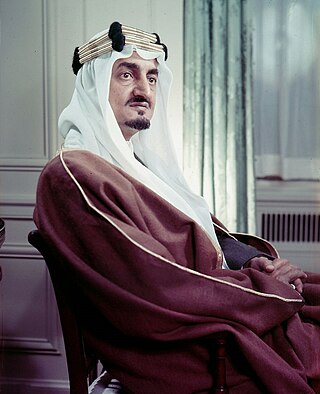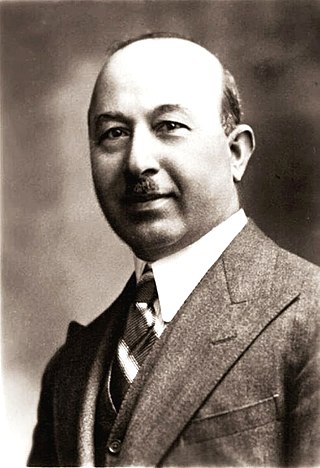
Abdulaziz bin Abdul Rahman Al Saud, known in the Western world mononymously as Ibn Saud, was an Arab political and religious leader who founded Saudi Arabia – the third Saudi state – and reigned as its first king from 23 September 1932 until his death in 1953. He had ruled parts of the kingdom since 1902, having previously been Emir, Sultan, and King of Nejd, and King of Hejaz.

Faisal bin Abdulaziz Al Saud was the King of Saudi Arabia from 2 November 1964 until his assassination in 1975. Before his ascension, he served as Crown Prince of Saudi Arabia from 9 November 1953 to 2 November 1964, and he was briefly regent to his half-brother King Saud in 1964. He was prime minister from 1954 to 1960 and from 1962 to 1975. Faisal was the third son of King Abdulaziz, the founder of modern Saudi Arabia.

Jamil Al Midfai was an Iraqi politician. He served as the country's prime minister on five separate occasions.

Fahd bin Abdulaziz Al Saud was King and Prime Minister of Saudi Arabia from 13 June 1982 until his death in 2005. Prior to his ascension, he was Crown Prince of Saudi Arabia from 1975 to 1982. He was the eighth son of King Abdulaziz, the founder of modern Saudi Arabia.

Saudi Arabia, officially the Kingdom of Saudi Arabia (KSA), is a country in West Asia. Located in the centre of the Middle East, it is one of the countries situated in the Gulf region. It covers the bulk of the Arabian Peninsula and has a land area of about 2,150,000 km2 (830,000 sq mi), making it the fifth-largest country in Asia, the largest in the Middle East, and the 12th-largest in the world. It is bordered by the Red Sea to the west; Jordan, Iraq, and Kuwait to the north; the Persian Gulf, Bahrain, Qatar and the United Arab Emirates to the east; Oman to the southeast; and Yemen to the south. The Gulf of Aqaba in the northwest separates Saudi Arabia from Egypt and Israel. Saudi Arabia is the only country with a coastline along both the Red Sea and the Persian Gulf, and most of its terrain consists of arid desert, lowland, steppe, and mountains. The capital and largest city is Riyadh; other major cities include Jeddah and the two holiest cities in Islam, Mecca and Medina. With a population of almost 32.2 million, Saudi Arabia is the fourth most populous country in the Arab world.

The House of Al Saud is the ruling royal family of Saudi Arabia. It is composed of the descendants of Muhammad bin Saud, founder of the Emirate of Diriyah, known as the First Saudi State, (1727–1818), and his brothers, though the ruling faction of the family is primarily led by the descendants of Ibn Saud, the modern founder of Saudi Arabia. It forms a subtribe of the larger prominent ancient Banu Hanifa tribe of Arabia, from which well known 7th century Arabian theologist Maslama ibn Ḥabīb originates. The most influential position of the royal family is the King of Saudi Arabia, an absolute monarch. The family in total is estimated to comprise 15,000 members; however, the majority of power, influence and wealth is possessed by a group of about 2,000 of them. Some estimates of the royal family's wealth measure their net worth at $1.4 trillion. This figure includes the market capitalization of Saudi Aramco, the state oil and gas company, and its vast assets in fossil fuel reserves, making them the wealthiest family in the world and the wealthiest in recorded history.

Ali Jawdat Al-Ayyubi was Prime Minister of Iraq from 1934–1935, 1949–1950, and in the latter half of 1957.

The Saudi Arabia national football team (SAFF) represents Saudi Arabia in men's international football. They are known as Al-Suqour Al-Arabiyyah and sometimes Al-Suqour Al-Khodhur, a reference to their traditional colours of green and white, and represent both FIFA and the Asian Football Confederation (AFC).

Saudi Arabia competed at the 1984 Summer Olympics in Los Angeles, United States. The nation returned to the Olympic Games after participating in the American-led boycott of the 1980 Summer Olympics. 37 competitors, all men, took part in 11 events in 5 sports.

Salman bin Abdulaziz Al Saud is King of Saudi Arabia, reigning since 2015, and was also Prime Minister of Saudi Arabia from 2015 to 2022. The 25th son of King Abdulaziz, the founder of Saudi Arabia, he assumed the throne on 23 January 2015. Prior to his accession, he was Crown Prince of Saudi Arabia from 18 June 2012 to 23 January 2015. Salman is the third oldest living head of state, the oldest living monarch, and Saudi Arabia's first head of state born after the unification of Saudi Arabia. He has a reported personal wealth of at least $18 billion, which makes him the third wealthiest royal in the world.

Lesbian, gay, bisexual, and transgender (LGBTQ) people in Saudi Arabia face repression and discrimination. The government of Saudi Arabia provides no legal protections for LGBT rights. Both male and female same-sex sexual activity is illegal within the country.

Jamal Ahmad Khashoggi was a Saudi journalist, dissident, author, columnist for Middle East Eye and The Washington Post, and a general manager and editor-in-chief of Al-Arab News Channel who was assassinated at the Saudi consulate in Istanbul on 2 October 2018 by agents of the Saudi government at the behest of Crown Prince Mohammed bin Salman.
Capital punishment in Saudi Arabia is a legal punishment. Most executions in the country are carried out by decapitation (beheading). Saudi Arabia is the only country that still uses this method. Capital punishment is used both for offenders of lethal crimes and non-lethal crimes, as well as juvenile offenders. Among those executed are individuals charged with non-lethal terrorism, a charge that has been used against individuals who participated in protests against the authoritarian regime in Saudi Arabia.

Abdullah bin Abdulaziz Al Saud was King and Prime Minister of Saudi Arabia from 1 August 2005 until his death in 2015. Prior to his accession, he was Crown Prince of Saudi Arabia since 13 June 1982. He was the tenth son of King Abdulaziz, the founder of Saudi Arabia.

Prince Sultan Military Medical City (PSMMC) also known as Riyadh Armed Forces Hospital is located in Riyadh City, the capital of Saudi Arabia, considered one of the most advanced centres in the Middle East. It is located in the heart of Riyadh. At a distance of approximately 20 kilometres (12 mi) from the city centre and easily accessible to the general population. PSMMC is part of the Medical Services Department (MSD) of the Ministry of Defense (MOD).
Hazem Adnan Jawdat Abu Hussein commonly known as Hazem Jawdat is a retired Jordanian footballer of Palestinian descent.

Mohammed bin Salman Al Saud, commonly known by his initials as MBS or MbS, is the de facto ruler of the Kingdom of Saudi Arabia, formally serving as Crown Prince and Prime Minister. He is the heir apparent to the Saudi throne, the seventh son of King Salman of Saudi Arabia, and the grandson of the nation's founder, King Abdulaziz.
The Senate of Iraq was the unelected upper house of the bicameral parliament established by the Mandatory Iraq's 1925 constitution. There were around twenty Senators, appointed for eight years by the King of Iraq. The Senate remained in existence until the 1958 revolution.
Youssef Jawdat is a Saudi Arabian archer. He competed in the men's individual event at the 1984 Summer Olympics.

The Al-Ayoubi family is a prominent family of royal and noble lineage, tracing its origins to the Middle Ages. The family originated in the ancient Armenian city of Dvin.














